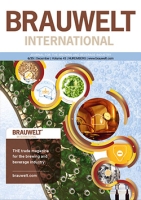Oxygen is one factor which causes beverages to deteriorate after filling. In particular, the replacement of glass bottles by plastic bottles has implications for the shelf life. As a consequence, packaging manufacturers and food technologists must have precise knowledge about the composition of packaging materials, oxygen permeation and the interaction between oxygen, the packaging and the foodstuffs. This article discusses the theory of permeation and factors influencing permeation. Results of oxygen permeation through plastic bottles and closures are presented. The results show that the three main methods for barrier improvement are internal coating of PET bottles, the use of PEN bottles and the incorporation of oxygen scavengers into bottles and closures..
Globalization in the brewing industry includes numerous takeovers of breweries and their integration into internationally active brewing groups. Product lines are incorporated or consolidated and existing technological solutions often need adaptation. This entails the necessity to process kegs with different fittings. KHS, Kriftel, has developed a system that is capable of seamlessly processing two different fitting types without system downtime.
Since early 2006, the Turkish Süral Group, which operates a chain of hotels on the Turkish Riviera, has been brewing its own beer and indeed bottling it for consumption not only in its own hotels but also for the free market, both national and international. At the beginning of the year 2006, Süral installed a complete Krones beer line for handling both returnable and non-returnable glass bottles. The line has been dimensioned for a speed of 24 000 0.33 l or 0.2 l bottles an hour, and for 20 000 0.5 l bottles an hour.
This contribution deals with sustainable improvement of the microbiological situation in breweries. Though the term “microbiological maintenance” sounds new, it has long been an integral part of comprehensive hygiene management in the food industry. Complementing CIP/SIP, environmental hygiene, GMP/GHP and aspects of product integrity (HACCP), microbiological maintenance includes measures for checking the effectiveness of cleaning and hygienic prophylaxis.
In March 1992, three Romanian businessmen established a small brewery in Targu Mures – under the name of S.C. Bere Mures S.A. Currently, the company is moving towards 1.5 million hl annual output. The newly installed equipment is geared to reflect this development and to cater for the planned market extension.
Plastic bottles take root due to numerous advantages (e.g. breaking strength, little weight) increasingly as primary packaging for beverages on the market. For the production of these bottles the material polyethylene terephtalate (PET) is widely used. Beside the advantages of PET-bottles, there are miscellaneous disadvantages, which, among other things, can have a negative effect on shelf life and preservation of biologically sensitive beverages. This article gives a literature overview on tunnel pasteurization.
Systems for production data acquisition have become an essential part of modern-day beverage bottling. The data from the inspection units are of particular significance in this context, since they directly supply information on the production output actually being achieved, enabling important line statistics to be compiled. The market already offers inspection and PDA systems compliant with standards for production data acquisition in the beverage industry.
Water suitable for human consumption has to meet microbiological requirements and must not exceed limit values regarding chemical substances that have a negative influence on drinking water. For compliance with these guidelines various treatment procedures for drinking water are admitted, which are discussed below.
Unless agreed otherwise,
Franke Beverage Containers expands its North American operations by acquiring the beer keg production activities of Spartanburg Stainless Products, Inc., South Carolina, USA. For many years the North American keg market has been successfully served by Franke Beverage Containers through its sales office in California with keg deliveries from its European production facility in Kreuztal, Germany.


